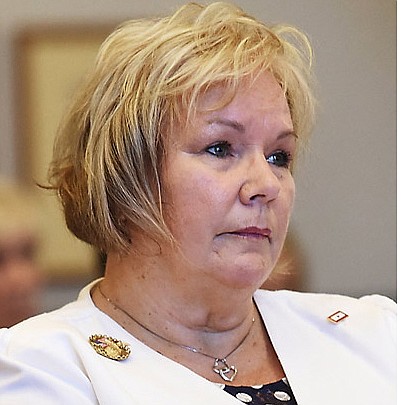Editor's note: This story has been modified to clarify Kerr was planning to work until 2019.
Pat Rowe Kerr, who is suing the Missouri Veterans Commission for gender and age discrimination and sexual harassment, could have received additional retirement benefits and a lower health care premium if she hadn't been terminated, according to evidence presented Friday.
Kerr is suing the commission and its director, Larry Kay, for gender and age discrimination and sexual harassment after she was terminated in November 2009. Kay maintains she was terminated because of a veto directing the commission to eliminate a position.
If Kerr had continued working for the commission until April 2019, she would have been eligible to receive an estimated $147,600 in a backdrop lump sum for retiring five years after her eligible retirement date, said Dave Dozier, senior benefit counselor for the Missouri State Employees Retirement System, during his testimony Friday.
Employees who work beyond their retirement eligibility date can receive up to five years of backdrop pay for 90 percent of what they would have received had they taken retirement on their eligibility date. Kerr was five years short of her retirement eligibility year because of her termination in 2009.Kerr, in earlier testimony, said she planned on working until 2019 when she would have been eligible for the estimated $147,600.
Kerr is also paying a higher health care premium because she was terminated before she was eligible for the discounted retirement rate, said Lisa Campbell, of the Missouri Consolidated Health Care Plan. The rate in January 2010 was $341 a month. A month later, it increased month by month until it reached more than $1,000 a month in 2012.
In 2012, her health care premium decreased, but her rate was still higher than it would have been if she had continued working for the commission.
More witnesses also testified about interactions between Kerr and Kay - several witnesses testified earlier in the week about phone calls or face-to-face interactions they witnessed.
Retired military officer Lt. Col. Regina Kilmer was one of Kay's subordinates in Kosovo in 2008, when they were deployed during a peacekeeping mission. She described Friday several instances during that time when Kay yelled at her.
Kay testified Thursday he had never yelled at anyone during the deployment and described Kilmer as an exemplary officer.
In October 2008, Kilmer said, she was in Kay's office when he suddenly said, "Do you know Pat Rowe Kerr? I'm going to have to fire her when I get back (from Kosovo)."
Kilmer said she doesn't remember if he explained why he made that statement. When Kilmer saw Kerr in April 2009, she warned Kerr of Kay's statement, Kilmer testified Friday.
Defense attorney Doug Leyshock asked Kilmer if the statement had anything to do with Kerr wanting to fly to Kosovo during the deployment as part of her role as ombudsman. There was no further context or explanation about the statement.
Marcia Mealy used to work with the commission in the capacity of her job prior to Kerr's termination. She testified Friday she remembered an instance when she was carpooling with Kerr and another commission employee, Stan Baughn, to a meeting at Fort Leonard Wood in mid-2009.
During the car ride, Kerr was talking on the phone with Kay - as Mealy later learned from Baughn - and Kerr sounded "extremely frustrated." Mealy said she was asking the same question over and over again and sounded worried. Mealy gathered there was a change happening with her position, and Kerr appeared to be concerned about being able to continue providing for her husband.
On Friday, veteran George Newell testified he was at a veterans' convention with Kay and Kerr when he witnessed an "intense" conversation between the two of them.
"They weren't yelling or waving their arms or anything, but it was intense," Newell said.
The conversation went on for about four hours. Afterward, Kerr talked to Newell, and from his recollection, Kay told her "she needed to find another job," Newell said.
Newell couldn't recall if that meant she needed to find a job outside the commission or if he was telling her to choose a different position within the commission. In July, Kerr went from being the ombudsman to the senior outreach adviser after the positions were split.
Testimony, which began Monday, is expected to continue through next week.

